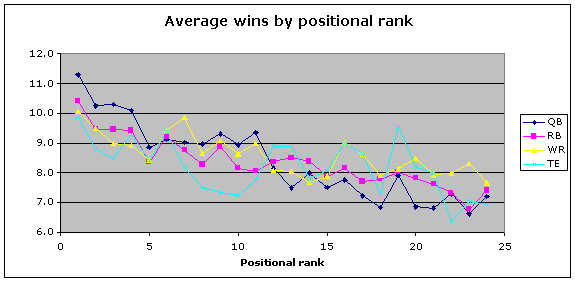
|
|
Login / Signup | ||
|

The San Diego Chargers are going to get throttled this year. I know it. You know it. It's going to be ugly. How much do we bump a player in our rankings because he is sure to play for a winning team? How much do we drop a player because his team will be terrible? I like to think I heavily consider a player's surrounding cast when creating my rankings. To not do so would be foolish. Case in point for me this season, I think the New England Patriots are still the best team in the NFL. Hence, I'm higher on Tom Brady than the average Footballguys.com staff member. Also, I have Priest Holmes ranked ahead of Tomlinson on my board, partly because I think the Chiefs will have a much better season. Well, I'm a statistics kind of guy, and statistics guys like to look at tables and graphs to find some patterns. I've been beating this concept around for a few years, but haven't been sure how to approach it. Here's what I did... Procedure
Pre-analysis Thoughts
And Away We Go Here is the condensed table of data.
This is hard for me to interpret on first glance in this format. However, I noticed right away that the top player at each position averages the most wins each year. I though it would be close, but didn't expect it to be true of #1 across the board, especially at the TE position. Here's the same data as a graph:  Thoughts About the Graph
Big Finish What does this mean in terms of LaDainian Tomlinson and your personal rankings? I'm afraid that it's not as relevant as I would like it to be. The #1 RB has been on a teams that have averaged 10.4 wins. This means that for every #1 RB on a 14 win team (Marshall Faulk, 2001), there was probably a RB on a 6-win team (Barry Sanders, 1990). If you feel Tomlinson is the exceptional case. You can feel justified in your rankings and projections. I think he's pretty darn special. However you have to realize that the odds are against us. The correlation aspect of the data doesn't really give us much to work with. There is a fairly obvious trend that we expected to see (remember the "Well, duh?"). Yes, better players play on teams that win more games. I'm guessing I won't get much argument on that as an overall trend <ducks> (because I sense some argumentative e-mail coming my way). However, the data indicates that positional ranking has stronger ties to winning teams for quarterbacks more than it does for other positions. In fact they rank as QB, RB, WR, TE in order of relevance. However, that amount of relevance is pretty darn small in the grand scheme of things. They only thing I feel I've proved here is that it should be a consideration when doing your rankings and projections, and more so for quarterbacks. Lastly, I may be opening a large can of worms here, but we should also ask
if there is a real cause and effect that can be studied. It's a "chicken
or the egg" sort of situation. Do winning teams give quarterbacks more
chances to score? Or do top quarterbacks help their teams win more often? I
have to say it's an obvious two way street and that both are probably true.
Which is truer? Not so sure about that one. My gut says it most likely the later. Dave Shick! PS Advice for the younger Footballguys.com members: Don't forget to be nice to the math studs. They may end up signing your checks someday. |
|
|||||||||||||||||||||||||||||||||||||||||||||||||||||||||||||||||||||||||||||||||||||||||||||||||||||||||||||||||||||||||||||||||||
|
Site Map | Contact
Us | Login
/ Signup
©Copyright Footballguys.com 2003, All rights reserved. |